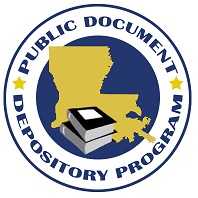

According to the Handbook for Depository Libraries
Act 493 created the public document depository program in the Office of the Secretary of State in 1948. In 1977, the functions of the program were transferred to the Office of the State Library within the Department of Culture, Recreation, and Tourism.
The Louisiana statute that provides the legal basis for the program is Louisiana R.S. Title 25, §§121-124.1. These statutory provisions are interpreted in the rules and regulations originally promulgated by the State Librarian in 1982 and are periodically revised.
The primary purpose of the depository program is to provide the people of Louisiana with access to state publications. Access to public documents is considered to be a basic right of citizenship in Louisiana. To ensure maximum access, depository libraries are strategically located around the state. The goal is that no citizen of Louisiana be more than a one-hour drive from a state documents depository library. The secondary purpose of the depository program is to create and preserve a centralized and organized historical record of Louisiana government via its public documents. This removes the burden of perpetual storage of documents from individual agencies while ensuring that the historical record will be preserved. The organization of documents and the reference assistance provided by depository library staffs facilitate access and allow historical researchers and other library users to go to a central location rather than approach each agency they are interested in individually (p.4).
Magale Library participates as a founding member of this program; we just celebrated our 75th anniversary of founding membership, which is to say that we also recently observed the 75th anniversary of the program's existence. Our participation is both foundational and voluntary: we serve as a "selective" depository. This means that we preserve and provide access to at least the most recent 5 years' worth of core collection titles, as well as other public documents across a range of subject categories (for example, higher education or agriculture). We make these documents discoverable (by this guide, through our catalog, and with Omnia), and they are available for public use free of charge during regular library hours. An informed public is an important goal all libraries have a share in promoting, and is consonant with our mission.
You can access the full list to the right, or by coming to the library.